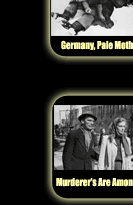

History during WWII
World War II brought not only defeat for the German nation, but also guilt. The country was divided: West Germany was controlled by the republics of France, Britain, and the United States, and East Germany became a communist state. The Nuremberg trials took place to judge the Nazi criminals. This was part of the de-Nazification process of Germany, designed to remove any remaining Nazis from influential positions of power and leadership. Many Germans found it difficult to cope with their guilt for the recent actions of the Third Reich, and it was difficult for them to begin to rebuild their country. Germany was in ruins from bombings. A large portion of the population had been killed in the past decade, either due to participation in the military or persecution by the Nazis. Many survivors returned to find either their homes or families to be gone. Refugees wandered about the country. Inflation was inevitable, substantially due to war reparations, and the standard of living dramatically decreased, as it was difficult to find the necessary food, shelter, and clothing. These factors led to the creation of a black market system in which bartering was the only way to obtain goods. Members of the war generation began to suppress their memories of the recent past and concentrate all of their efforts to economic success, bringing about the "Economic Miracle." However, Germany, at the time, was basically devoid of emotion. Nevertheless, despite all of the hardships, a small group of directors, writers, and actors surfaced, determined to make sense of their past. Thus, a new era of German film was born, giving rise to a myriad of films in which the nation attempted to cope with its recent past.


